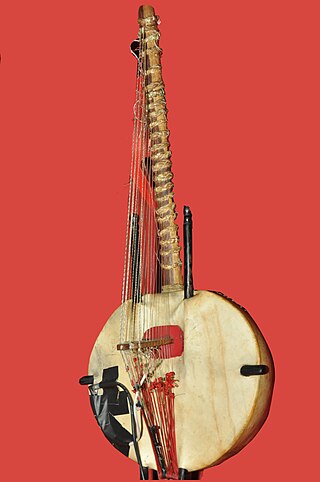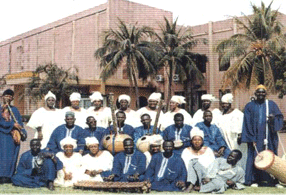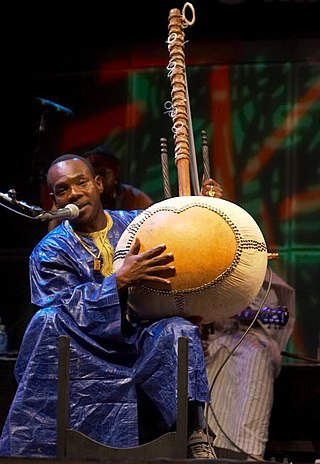
The kora is a stringed instrument used extensively in West Africa. A kora typically has 21 strings, which are played by plucking with the fingers. It combines features of the lute and harp.

The balafon is a gourd-resonated xylophone, a type of struck idiophone. It is closely associated with the neighbouring Mandé, Senoufo and Gur peoples of West Africa, particularly the Guinean branch of the Mandinka ethnic group, but is now found across West Africa from Guinea to Mali. Its common name, balafon, is likely a European coinage combining its Mandinka name ߓߟߊ bala with the word ߝߐ߲ fôn 'to speak' or the Greek root phono.

The music of Mali is, like that of most African nations, ethnically diverse, but one influence predominates: that of the ancient Mali Empire of the Mandinka. Mande people make up around 50% of Mali's population; other ethnic groups include the Fula (17%), Gur-speakers 12%, Songhai people (6%), Tuareg and Moors (10%).

A griot is a West African historian, storyteller, praise singer, poet, and/or musician.

The Mandinka or Malinke are a West African ethnic group primarily found in southern Mali, the Gambia and eastern Guinea. Numbering about 11 million, they are the largest subgroup of the Mandé peoples and one of the largest ethnic-linguistic groups in Africa. They speak the Manding languages in the Mande language family and a lingua franca in much of West Africa. Over 99% of Mandinka adhere to Islam. They are predominantly subsistence farmers and live in rural villages. Their largest urban center is Bamako, the capital of Mali.
Jawara is the English transcription of a surname of Manding origin. Notable people with the name include:

Kandia Kouyaté is a Malian jelimuso and kora player; she has earned the prestigious title of ngara, and is sometimes called La dangereuse and La grande vedette malienne. Kouyaté's dense, emotional, hypnotic manner of singing and her lyrical talents have earned huge acclaim in Mali, though she remained relatively little known outside Africa, due to extremely limited availability of her recordings. Her home town of Kita is known for love songs, which form a large part of Kouyaté's repertoire. She also sings praise songs.

Toumani Diabaté is a Malian kora player. In addition to performing the traditional music of Mali, he has also been involved in cross-cultural collaborations with flamenco, blues, jazz, and other international styles. In 2006, the London-based newspaper The Independent named Diabaté one of the fifty best African artists.

Ba Cissoko is a Guinean world music band featuring five members, two of whom play the traditional Kora harp. Two band members play percussion instruments and one plays bass. The sound of the band has been described as "West Africa meets Jimi Hendrix".
Moussa Kouyate is a kora player from Bamako, Mali. His father, Batourou Sekou Kouyate, was also a prominent kora player.

Articles related to Mali include:
Mah Damba is a traditional griot singer. She comes from a family of griots: her father, Djeli Baba Sissoko, was a griot and her aunt, Fanta Damba, is also considered a top vocalist.
Djeli Moussa Diawara, born 1962 in Kankan, Guinea, is a Kora player (Korafola), composer and singer.
Dembo Konte(or Konté) & Kausu Kuyateh were master kora players from West Africa. They were also singers and, above all, jalis; storytellers and guardians of oral tradition, preserving the history of people and events via their music. Stories and history are passed down from generation to generation by this method within families and groups of friends, ensuring survival of such stories for centuries. The jali sings the praises of his friends and benefactors, warns the politicians of their errors and admonishes the listeners to live right. Their music encapsulates the Mandinka culture.
Mamadou Sidiki Diabaté is a prominent Mandé kora player and jeli from Bamako, Mali. He is the 71st generation of kora players in his family and a son to Sidiki Diabaté.

Kora Jazz Trio is a three piece African musical group, founded in 2002 by Djeli Moussa Diawara, Guinean Korafola, with Abdoulaye Diabate and Moussa Sissokho, best known for producing a music that is a mix of American jazz with traditional African music. Described as "the encounter between mandinga musical tradition and the freedom of jazz, between West African percussion and Afro-American swing", they have been recognized for their focus on sharing their cultural heritage, without doing so for the sake of mainstream success or in an effort to create a movement.
Kevin Brown is an English blues guitarist, songwriter and singer. His main genre is the blues, although he has spread out his style to incorporate country, folk, Americana and world music over an almost forty-year professional career. He has released twelve albums to date, which included collaborations with Moussa Kouyate and Gary Rudd. Performing from the main stage at the Glastonbury Festival to the bars of Texas, Mark Knopfler stated that Brown "offers far more than your average slide player".











